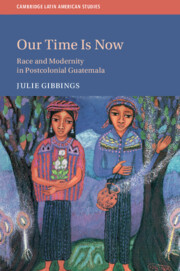Book contents
- Our Time Is Now
- Cambridge Latin American Studies
- Our Time Is Now
- Copyright page
- Dedication
- Contents
- Maps, Figures, and Tables
- Acknowledgments
- Introduction
- Part I Translating Modernities
- 1 To Live without King or Castle
- 2 Possessing Sentiments and Ideas of Progress
- 3 Indolence Is the Death of Character
- 4 El Q’eq Roams at Night
- Part II Aspirations and Anxieties of Unfulfilled Modernities
- Conclusion
- Glossary
- Index
- Cambridge Latin American Studies (continue from page ii)
2 - Possessing Sentiments and Ideas of Progress
Coffee Planting, Land Privatization, and the Liberal Reform, 1871–1886
from Part I - Translating Modernities
Published online by Cambridge University Press: 01 July 2020
- Our Time Is Now
- Cambridge Latin American Studies
- Our Time Is Now
- Copyright page
- Dedication
- Contents
- Maps, Figures, and Tables
- Acknowledgments
- Introduction
- Part I Translating Modernities
- 1 To Live without King or Castle
- 2 Possessing Sentiments and Ideas of Progress
- 3 Indolence Is the Death of Character
- 4 El Q’eq Roams at Night
- Part II Aspirations and Anxieties of Unfulfilled Modernities
- Conclusion
- Glossary
- Index
- Cambridge Latin American Studies (continue from page ii)
Summary
Chapter 2 examines how Q’eqchi’ patriarchs addressed the challenges posed by popular pressures from below and new state efforts to modernize by privatizing property, institutionalizing coerced wage labor, and expanding state authority after the 1871 Liberal revolution. Q’eqchi’ patriarchs’ efforts included culturally translating communal properties into coffee plantations, engaging in the scientific cartography, and converting the spatial markers of mountain spirits into boundary markers. Ultimately, however, the efforts of Q’eqchi’ patriarchs to forge coffee plantations was limited because of internal pressures within indigenous communities, predatory capitalists, and state officials unwilling to recognize their plantations and grant labor exceptions to their workers.
Keywords
- Type
- Chapter
- Information
- Our Time is NowRace and Modernity in Postcolonial Guatemala, pp. 75 - 110Publisher: Cambridge University PressPrint publication year: 2020

